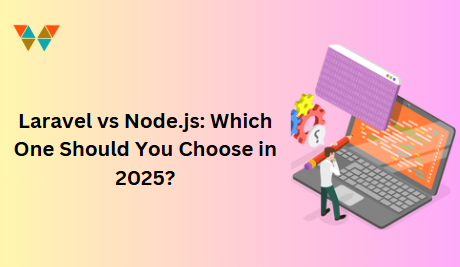Django vs NodeJS: Which is better for Web Development?

Node.js and Django are the two most popular web frameworks. Both have existed for several years and have gained a lot of support. Both Node.js and Django are good for building web applications, but the process of requests and responses is very different. All of these important aspects depend on the back-end structure of the app that is invisible to the user. The backend or server side of the app directly affects the client side that the user interacts with. Therefore, a slow backend or poor performance can negatively affect the user experience. In this article, we will look at the difference between Django vs NodeJS and find out which one is better.

Django vs NodeJS
What is Django?
Django is a powerful Python full-stack web framework packed with the ability to solve all common web development problems. This includes user authentication and content management. With the removal of the boring, the development team can focus on the important and unique parts of the project, providing a surprisingly fast MVP that works. Github has over 71,800 stars and over 2,400 contributors, and Django is considered to be quite popular among developers. More than 2,600 companies reported using Django in Stackshare. Although Node has convinced more companies than Django, this is a solid figure given that huge brands such as Instagram, Robinhood, Disqus, Glovo and Pinterest are included in these companies.
Advantages
- Django is easy to install and use.
- Provides a simple user interface for several administrative tasks.
- Django supports end-to-end application testing.
- The REST framework supports a wide range of authentication mechanisms.
- Provides an integrated authentication system.
- Multiple cache technologies are included in the cache framework.
- Dynamic HTML page support
- Simple and sophisticated documentation
Disadvantages
- It is important to have the necessary knowledge because it is highly dependent on Django ORM.
- The length of the code is long and relatively complex.
- Django is a monolithic framework. In other words, a single, huge app can only be deployed as a whole.
- Deploying is generally a risk, as errors in deploying can cause a system-wide crash.
- Restart the entire server using automatic reload.
What is Node.js?
Node.js is bundled with many frameworks, but Node.js is not a framework – actually a JavaScript execution environment built on Chrome’s JavaScript engine. Created to write server-side applications in JavaScript, Node.js has been selected by many developers. The developers appreciate that Node.js can build apps that handle web traffic well, have good libraries and communities, and are very useful when creating APIs. As of July 2023, Node.js has more than 96,400 stars on Github, collecting over 188 contributors and 203 repositories. According to Stackshare, more than 8,000 companies, including tech giants such as Uber, Netflix, Twitter, Glovo, PayPal and Asana, have reported using Node.js.
Advantages
- It is based on widely used JavaScript.
- Large community and simple learning curve.
- Includes first-class package managers.
- Parallel request management is handled quickly and simply.
- Scalable and easy to use.
- Quick caching reduces processing time.
Disadvantages
- Working with asynchronous queries may be difficult for some developers.
- Poor performance when handling heavy computing tasks.
- Because the API is unstable, Node.js invites many code modifications.
- Node.js asynchronous programming model makes code maintenance difficult.
- Insufficient library support can put your code at risk.
Django vs Node.js: Head-to-head comparison
With the basic specifications of Django vs NodeJS, the pros and cons of both technologies, and the benefits both have brought to global companies; it is time for a detailed comparison between Django vs NodeJS. It will help you better understand what both technologies can provide for your project and answer questions: “Node or Django?
Popularity
Both Django and Node.js are among the top 10 most used web frameworks among developers.
According to Statista’s research data, Node.js ranks first among web frameworks and is used by 47.12% of web developers worldwide. In contrast, Django ranks 9th in the top 10 and is used by 14, 65% of the surveyed experts.
When you compare the amount of Django vs NodeJS websites available on the Internet, Node again exceeds the number. According to Webtechsurvey, over 980,000 live websites use Node.js and about 86,000 uses Django.
Winner: Node.js is widely used and popular worldwide.
Community
When deciding between Django vs NodeJS in web development, it is important to consider the scale and strength of each technology community. With a vast community, the framework is regularly evolved and updated, allowing beginner programmers to always get support from hands-on professionals. This will help speed up project development and ensure safety.
Node.js has a vast web community with 94.1K stars on GitHub and thousands of experienced engineers support updates and customizations. Node.js is also supported by global IT giants like Joyent, Microsoft and IBM to ensure accelerated environmental development.
Django cannot boast a thriving community because Python is not used by JavaScript.
Winner: With the popularity of winner Node.js-JavaScript, the platform has greater community and support.
Architecture
The framework architecture describes how the framework works, including the interaction of core components and how requests and responses are handled.
Node.js is built with an event-driven architecture that handles many events generated by users in real time. With non-blocking and asynchronous processing for all processes, multiple requests can be processed simultaneously without slowing down the app. The result is faster loading and Node.js is the best tool for real-time applications.
Django uses the Model Template View architecture. This divides the app into three components: model (data structure), view (business logic), and template (user interface). With this structure, each function can be handled independently and complex web apps can be developed faster and safely.
Winner: Node.js if you need real-time functionality. Use Django if you need a structured application to handle large amounts of data.
Scalability
Django vs NodeJS are both scalable tools, but their approach to scalability is different. The best approach depends on project specific requirements.
Node.js is the ideal tool for building scalable applications that can handle hundreds of simultaneous real-time requests without compromising performance. Additionally, Node supports micro service architecture, enabling developers to build small, easily scalable modules for apps.
On the other hand, Django cannot boast such a function, but can be expanded to handle a large amount of traffic. To that end, developers can add servers and use load balancing and caching functions.
Winner: Node.js is excellent because it has built-in scalability features, but Django needs more effort to scale effectively.
Security
It is important to consider in advance because security characteristics can affect both the duration of the project and the security of the application.
Django incorporates security middleware to protect against widespread attacks like SQL injection, cross-site scripting, cross-site request fake, and click-jacking.
Since Node.js has no default security settings, developers must implement security practices manually. This can take time and lead to potential security vulnerabilities if not implemented correctly.
The winner: Django and Node.js security comparison is led by Django, which provides ready-to-use middleware.
Usability
The usability of Django vs Node JS is defined by ease of use for developers and the option to customize the app.
Node.js has a flexible and minimal structure that allows developers to design templates from scratch or customize existing ones. Developers can also access Node Package Manager (npm). You can easily add new features and increase flexibility.
Django provides ready-made solutions to make project development fast and efficient. However, Django has a rigid structure that limits the flexibility and ability to customize applications.
Winner: Node.js – High degree of customization freedom, development from scratch is possible. Node.js also has many free libraries that can easily add new development features.
Performance
Excellent performance is very important because it directly affects application load times and user experience. It is important to remember technical features when comparing Django and Node.js.
Node.js is a platform for running JS code on servers. Using Google V8 engine to run JS code surprisingly fast improves app performance. On the other hand, since Node.js is single-threaded, it cannot handle heavy tasks including the Central Processing Unit.
Django uses multiple threads to deliver high performance on tasks that are loaded on the CPU. On the other hand, because JavaScript is thought to work faster than Python, Django is inferior in other cases.
Winner: While Node.js performs great in most cases, Django is good for heavy data processing.
Technology Stability
In terms of web app stability, Django vs NodeJS both provide testing, debugging, and database management tools.
Node.js has been used for over 10 years. Maintenance and ongoing development of Node.js is overseen by large and active communities and global IT companies. They contribute to their stability by addressing issues and releasing updates. Node.js has become an improved and stable technology.
Django also exists for many years and has established itself as a stable and reliable technology. The community is active and maintains a framework with regular updates and security patches. Django is also a stable tool, built on a well-established Python language and following a strict development philosophy.
Winner: Both technologies are reliable.
Cost Efficiency
Reducing development time can reduce costs in the short term. On the other hand, the long-term possibilities of Django and Node.js.
Node.js takes longer to develop applications than Django. However, Node.js is widespread and easy to learn using JavaScript, making it easier to find experienced developers. Additionally, Node.js middle and senior developers may specialize in front-end development, reducing the need to divide frontend teams.
Django encourages rapid development and targets “perfectionists who are chased by deadlines.” However, this framework is difficult to learn, and the number of developers is small. Django projects require another team of front-end specialists, which will incur additional costs.
Winner: In some cases Node.js may require more development time, but with a large and experienced developer pool, it is easier to discover and hire human resources. On the other hand, Django’s focus on rapid development may reduce time to market, but may require additional resources for front-end development.
Developers’ availability
Whether we can secure the necessary professionals is a critical factor. Hiring talented developers in-house is becoming more and more costly, so many companies are hiring developers remotely to boost their workforce.
It’s hard to tell how many Node.js developers are worldwide. Because Node.js is a No.1 web framework used by professional developers, the number is likely to be the highest. In terms of costs, the average rate of remote web developers using Node.js in Europe is about $30-80 per hour, depending on their level of expertise.
Django developers are hard to find because they have fewer frameworks in use than Node. If you are looking for Django developers in Europe, you can expect an average rate of $25-95/h.
Winner: Node.js because it is used by more professional developers.
Full stack development
Django vs NodeJS have different approaches to full-stack development.
Django is a backend technology mainly dependent on Python. Cannot be used for full stack development. To build a front-end, developers need to use JavaScript libraries and JS frameworks like React, Angular, and View.
On the other hand, Node.js can use JavaScript to build both front and back ends for any application. This makes Node.js a true full-stack platform. This capability of Node.js is a major advantage for Django in the development of web apps that save time, effort and resources, especially with full-stack technology.
Winner: The winner is Node.js because Node.js can use one language to build web apps.
What to choose: Django vs Node.js
One thing is clear in this tough Django vs NodeJS competition. Let’s compare Django to Node.js in a typical usage scenario so you can make the right choice.
When is Django best?
Django is ideal for:
- Content-based applications that emphasize providing dynamic and personalized content, such as news sites and e-learning platforms;
- With applications requiring large amounts of data processing, such as analytics and machine learning tools, Django’s built-in features like ORM and management panels help streamline the development process;
- Large enterprise-level applications. Django provides a huge amount of built-in capabilities ideal for complex projects;
- Applications that require enhanced security, such as banking and financial systems;
- Monolithic architecture and structured codebase for easy maintenance projects;
- Projects with limited budgets due to the need to hire both front and back end teams.
What is Node.js best for?
Node.js is ideal for:
- Real-time applications that require immediate updates and fast response, such as online chat, collaboration tools, and online game platforms;
- microservices architecture projects for advanced scalability;
- Dynamic and customizable web applications. Node.js enables enhancements and provides flexibility in the design of app architectures;
- Projects that require full stack technology to seamlessly switch between front and back-end tasks.
- Long-term cost optimization. Node is a full stack technology and Node.js specialists are full stack developers who can handle the server and client side of the app.
Conclusion
In conclusion, Django vs NodeJS address different web development needs. Based on Python, Django is ideal for complex database-driven applications that focus on rapid development and scalability. Built on JavaScript, Node.js is ideal for real-time, event-driven applications that require high performance and scalability, including chat platforms and streaming services. Witarist is the best choice for professional web development services. Their experienced team will guide you in selecting and building the best solution in Django and Node.js. Focusing on performance, scalability and user-centric design, WitArist ensures that all projects meet the client’s specific goals.


